Despite many reservations, we drove there, over 150 kilometres of gravel road, to one of three winegrowers there are in Namibia. The "winegrower" Bertus Boshoff is actually a doctor in the northern village of Otavi, which lies in one of the areas of Namibia with the highest rainfall, the so-called "maize triangle". Copper was mined here for a long time, but today it is mainly agriculture and trade. The wine farm "Thonninghii" is not easy to find, it is a bit off the main road in the Otavi Valley and there is no road sign pointing to it.
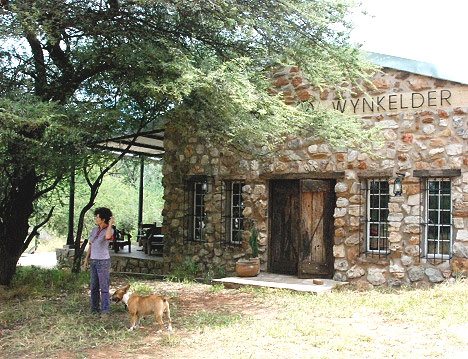
|
| The small winery of Bert and Ebbie Boshoff is off the road% about 8 kilometres south of Otavi. |
But Elke, in the thrift store, who speaks accent-free German as if she had grown up in Hamburg and not in Namibia, patiently explains the way to us, even for the second time: "The doctor is not here now, he still has consulting hours, but his wife is surely at the winery. The grapes are prepared and vinified in a spotlessly clean, simple little room. Three concrete tanks, without high-tech regulation, the usual small steel tanks and vats, a machine for de-stemming, pumps and hoses, everything is reminiscent of the time when small winegrowers made their wines themselves on the farm with the simplest of means. Winemaker's craft instead of highly developed cellar technology.
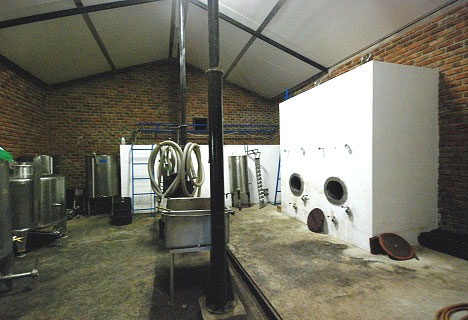
|
| Simple% but practical cave for processing the grapes. |
There is neither a concentrator nor sophisticated technology, neither computer-controlled processes nor fully automatic lifting and transport equipment. I am reluctant to ask all the routine questions one asks when visiting a winemaker: Spontaneous fermentation, maceration, malolactic fermentation, fining, ageing in barrels, yield reduction, and, and, and... Is wine production here just an experiment or even the quirk of an oddball Namibian? Neither the one nor the other. At the "Thonningii" wine farm, work is done professionally throughout, even if the farm is not yet an economic factor. With barely half a hectare of vines, it is far too small for that.
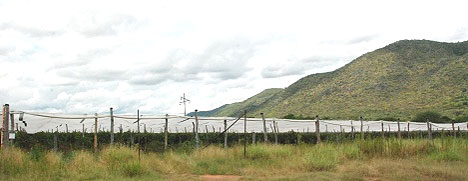
|
| Vineyard on the plain of the Otavi Valley% Covered by nets for protection against birds. |
On the way to the vineyard, the winemaker-doctor talks about his philosophy of life: "When a young Namibian asks me how to become a doctor or a winemaker, I always have only one answer: "Read, read..., learn, start today and not tomorrow. That's how I became a doctor - contrary to the plans of my father, who was a farmer - and that's how I later built up my vineyard." As a winemaker, Bert Boshoff is a self-made man in the truest sense of the word. Because he is convinced that good wine can be made in the relatively fertile north of Namibia, he has taken the initiative and planted vines: Shiraz in the main. He can bottle about 2,000 bottles a year, a quantity too small to keep up profitably in a market that is dominated exclusively by South African wines. His son Gilmar, however, studied oenology and now works at the South African winery "Klein Parys" in Paarl. "As soon as he has gained enough experience in viticulture, he wants to return home and expand the small business.
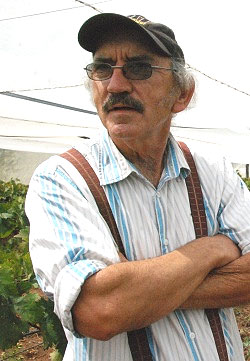
|
| Bert Boshoff% the popular doctor and winemaker of Otavi, a village of 5000 people. |
The chances of success are very good, because the wine that is already being pressed here can compete with South African wines in terms of quality. "Our main problem is the variability of the wines from year to year. The most important factor is the rain. Depending on the amount of rain, quite different wines are produced from the same grapevine." That's why the doctor-vintner is already experimenting with different grape varieties - white and red, from Viognier to Cabernet: "Maybe one day a typical Namibian cuvée will emerge." That the doctor is serious about his second profession is shown by a remark made during the conversation. "One of the other two Namibian winemakers now lives in the capital. He only comes to his winery, which is a few hundred kilometres away, from time to time. I told him: a winemaker always belongs to his vines!"
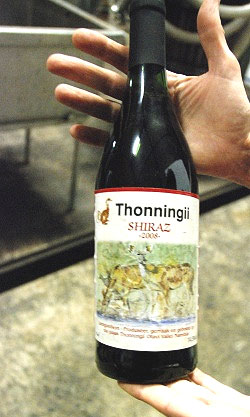
|
| Shiraz from the Thonningii winery - only 200 bottles are bottled per year. |
As is so often the case with small, artisanal wineries, the main problem for marketing is the cost of production. Wines from South Africa flood the market, mainly well-made "industrial wines". These are smooth, simple, easy to consume and can be bought everywhere at good prices. The very next day provides proof of the situation. About 80 kilometres south of Otavi we spend the night at the "Frans Indongo Lodge" in Otjiwarongo, which is managed by a man from Dresden. A beautiful guesthouse, in the middle of a huge farm with free-roaming animals, a dream holiday destination in Namibia. The host immediately shows interest when he hears that we have been to the doctor winemaker in Otavi. "A good wine from the area, that's still missing on my wine list. A Namibian wine, that would be a real attraction!" But his interest quickly wanes as soon as we mention the price. It costs about as much ex-farm as the many far more pleasing wines from South Africa cost in the restaurant, which sell far better. "The wine list has to be profitable for our company as well! So his wine list will probably continue to do without Namibian wine.
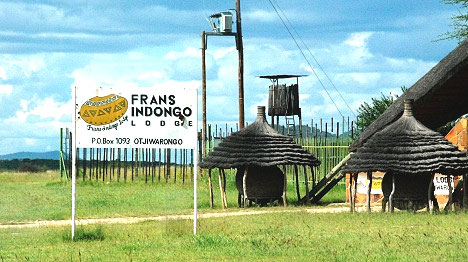
|
| Namibian wine - an attraction for many lodges and hotels in Namibia. |
So will the doctoral winemaker from Otavi remain a fantasy? I mean: no. His life motto, "read, read..., learn and start today" has put him on the right track. Instead of the Zonnenbloems, Beyerskloofs, Bushmans, Nederburgs and Overmeers from South Africa, which are now offered in every supermarket, restaurant and lodge in the country, wine lovers may find an alternative in the near future. A wine that is not flattering and almost arbitrarily interchangeable, but has character, reveals terrroir and bears a "signature". The signature of a committed winemaker in the green Otavi Valley, in a country otherwise characterised by drought. The Shiraz that is already being produced here has all the prerequisites to become not quite great, but unmistakable, good and independent, with genuine Namibian character.
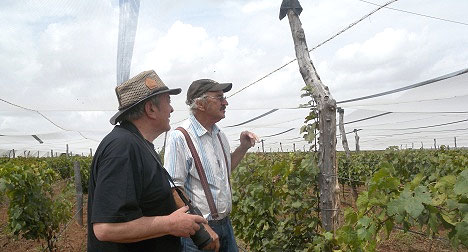
|
| Bert Boshoff (right) together with columnist Peter Züllig (left). |
Sincerely
Yours/Yours